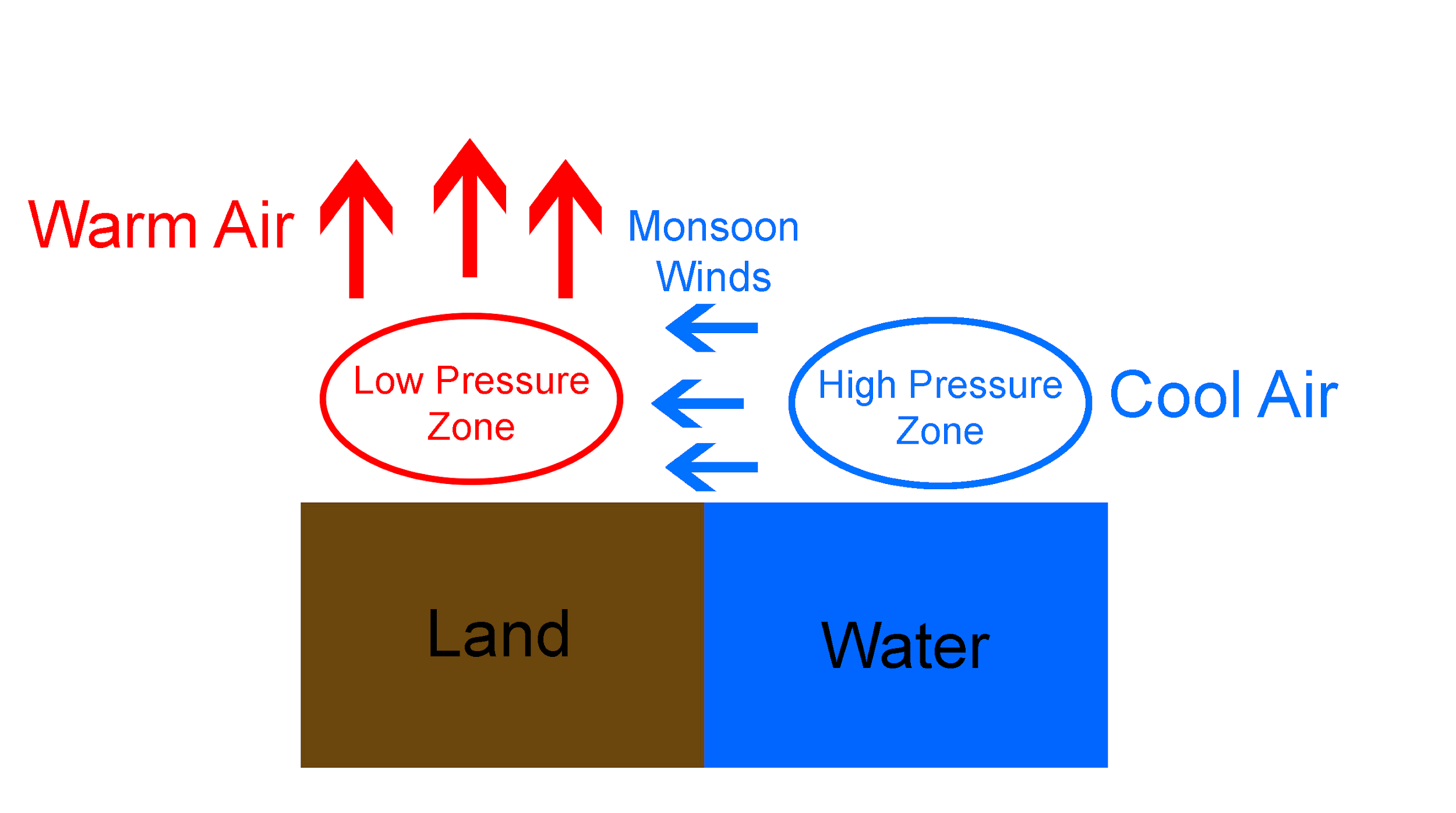
How are monsoon winds formed?
A. The air over the land gets heated and rises. This causes the winds to flow from the oceans towards the land, which gives rise to Monsoon winds.
B. The pressure difference in adjoining areas gives rise to air movement which leads to the formation of Monsoon winds.
C. Air that is warmed up near the Equator, moves towards each pole causing the Monsoon winds to blow.
D. None of the above
Answer
586.8k+ views
Hint: Land heats much faster than oceans due to the sunlight, this will cause the air above the land to heat up and rise, creating a low-pressure zone above land. Thus the air above the ocean (high-pressure zone) will move towards the land and are called monsoon winds.
Complete answer:
Before moving on to the actual solution, let’s cause the process due to which wind blows.
We receive a lot of heat energy from the sun, called solar energy. The land and the oceans receive this solar energy. This solar energy will heat both the land and the oceans. But as you may know, water bodies require more energy to heat up than land, so the land area starts becoming warmer much quicker than the oceans. So this will mean that the air that is in contact with the land will heat up whereas the air above the oceans will not heat up as much.

We know that hot air rises and cold air does not. So the hot air above the land will rise but the air above the oceans will not. This will lead to the formation of a low pressure zone above the land. We know that air moves from high-pressure zones to low-pressure zones, so the air above the ocean which is a relatively high-pressure zone will rush towards the land. This rush of air will have a lot of moisture which will bring rain and hence monsoon.
Thus, the air over the land gets heated and rises. This causes the winds to flow from the oceans towards the land, which gives rise to Monsoon winds.
So, the correct answer is “Option A”.
Note:
The monsoon winds that we discussed in the solution are very important for the people. A good monsoon means a substantial amount of rain which will lead to a good harvest for the farmers. In India monsoon is caused by monsoon winds coming from the Indian Ocean around the middle of the year.
Complete answer:
Before moving on to the actual solution, let’s cause the process due to which wind blows.
We receive a lot of heat energy from the sun, called solar energy. The land and the oceans receive this solar energy. This solar energy will heat both the land and the oceans. But as you may know, water bodies require more energy to heat up than land, so the land area starts becoming warmer much quicker than the oceans. So this will mean that the air that is in contact with the land will heat up whereas the air above the oceans will not heat up as much.

We know that hot air rises and cold air does not. So the hot air above the land will rise but the air above the oceans will not. This will lead to the formation of a low pressure zone above the land. We know that air moves from high-pressure zones to low-pressure zones, so the air above the ocean which is a relatively high-pressure zone will rush towards the land. This rush of air will have a lot of moisture which will bring rain and hence monsoon.
Thus, the air over the land gets heated and rises. This causes the winds to flow from the oceans towards the land, which gives rise to Monsoon winds.
So, the correct answer is “Option A”.
Note:
The monsoon winds that we discussed in the solution are very important for the people. A good monsoon means a substantial amount of rain which will lead to a good harvest for the farmers. In India monsoon is caused by monsoon winds coming from the Indian Ocean around the middle of the year.
Recently Updated Pages
Master Class 9 General Knowledge: Engaging Questions & Answers for Success

Master Class 9 Social Science: Engaging Questions & Answers for Success

Master Class 9 English: Engaging Questions & Answers for Success

Master Class 9 Maths: Engaging Questions & Answers for Success

Master Class 9 Science: Engaging Questions & Answers for Success

Class 9 Question and Answer - Your Ultimate Solutions Guide

Trending doubts
Difference Between Plant Cell and Animal Cell

Fill the blanks with the suitable prepositions 1 The class 9 english CBSE

Who is eligible for RTE class 9 social science CBSE

Which places in India experience sunrise first and class 9 social science CBSE

What is pollution? How many types of pollution? Define it

Name 10 Living and Non living things class 9 biology CBSE




